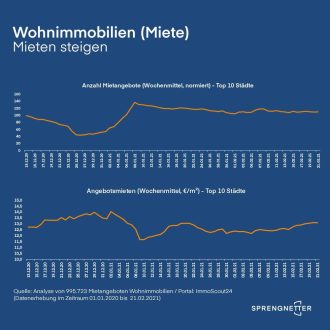Implementation of Basel III regulations leads to more difficult financing conditions for the real estate industry
"At a time when affordable construction and housing are being discussed, such measures have a counterproductive effect and further exacerbate the already precarious situation in metropolitan areas," says ZIA President Dr. Andreas Mattner. "In the long term, the real estate industry is dependent on a stable and predictable financing environment in order to master the challenges of the future. This is all the more true in view of the immense financial challenges that the Green Deal will entail, the individual measures of which are not even fully foreseeable today."
On the other hand, ZIA takes a positive view, for example, of the possibility of assigning preferential risk weightings to national real estate markets in the EU by means of so-called "hard tests."
"Due to the historically low default rates in the German real estate market, this step was more than necessary," says Sabine Barthauer, Deputy Chair of the ZIA Financing Committee. In addition, ZIA also supports the greater consideration of current market values in the calculation of risk weights, as well as generous transitional relief for residential real estate financing and companies without external ratings. "These largely temporary relief measures are a step in the right direction, but have not been thought through to their logical conclusion," explains Barthauer. "In combination with other elements from the implementation proposal, the relief sought by the European Commission therefore turns out to be modest."
In particular, the consistent implementation of the so-called output floor will cause additional capital requirements for banks. The early proposal of the real estate industry to apply a "parallel stacks approach" to prevent gold-plating by taking into account additional European capital buffers was not adopted. Instead the European Commission has envisaged to temporarily "freeze" individual capital buffers, such as Pillar 2 requirements, and to review them in principle. "However, whether this measure can compensate for the negative effects of the output floor is more than questionable," says Barthauer.
ZIA will follow the legislative process intensively and is available to the European institutions at any time with its and its members‘ expertise.
The German Property Federation (ZIA) is the leading umbrella association for the property sector. With its registered office in Berlin and a European office in Brussels, it speaks through its more than 300 members, including 28 associations, on behalf of approximately 37,000 industry companies right across the value chain. The ZIA provides comprehensive, unified representation for the interests of the real estate sector in all its diversity at both national and European level, including as a member of the Federation of German Industries (BDI) and the German Economic Institute (IW). The President of the association is Dr Andreas Mattner.
ZIA Zentraler Immobilien-Ausschuss e.V.
Leipziger Platz 9
10117 Berlin
Telefon: +49 (30) 2021585-0
Telefax: +49 (30) 2021585-29
http://www.zia-deutschland.de
Pressesprecher
Telefon: +49 (30) 202158523
E-Mail: andre.hentz@zia-deutschland.de
![]()




